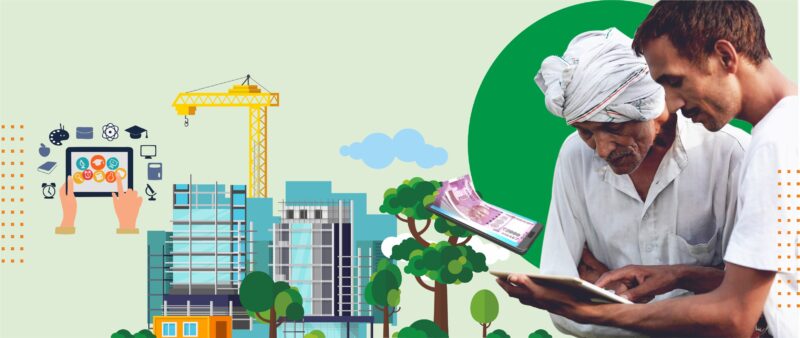When we look at the 2022 budget from the perspective of sustainable development, elements of inclusive development, digital transformation and circular economy appear as cross-building strands of near term and long-term actions spelt out in abundance.
Considering the Amrut Kaal (India’s journey from @75 to @100) as the overall span of this budget’s strategic thrust, it is very crucial see its intents and commitments which have the potential of serving the most underserved and most marginalised constantly seen as drifting away from the social and economic mainstream.
In terms of the guiding philosophies and the maturing practice of Corporate Social Responsibility (CSR) in India, it would be worthwhile to understand the tell-tale linkages between the budget as a harbinger of growth and the social and environmental capital.
Education
Stress on ICT for content, infrastructure and capacity building for K-12 public education looks very promising and serve as a great opportunity of convergence between the government and the corporate-NGO axis for better realisation of the commitments towards widespread implementation.
Hub-Spoke model for regional universities’ collaboration with the centres of excellence through digital connect is also a welcome move which may provide many a potential opportunity of collaboration between the industry and academia to build relevant content and knowledge bank in specific need-based areas.
Health
An open digital platform for the health ecosystem with digital registries to facilitate universal access to health facilities can be helpful to CSR stakeholders in leveraging these resources for better efficiency and outreach to the beneficiaries of various healthcare programs.The budget has introduced a National Tele Mental Health Programme to provide access to quality mental health counselling and care services with a network of 23 tele-mental health centres of excellence in collaboration with NIMHANS and International Institute of Information Technology-Bangalore (IIITB). Mental health needs greater focus especially in the last two years of pandemic, hence such central program can become a modular component of a CSR program aimed at holistic wellness of an identified set of communities.
Skill Development
Move to increase skilling programs in ITIs, greater partnership with industry to strengthen theNational Skill Qualification Framework (NSQF), Digital Ecosystem for Skilling & Livelihood (DESH) are some of the pronouncements which are aimed to encourage skill development leading to better livelihoods for citizens. As evidenced from various CSR reports from the industry as well as the advisory entities, skill development has evolved as a major thrust area for the strategic CSR. Along with skilling , more stress is being given on training, mentoring and nurturing cohorts of entrepreneurs by various corporates. Initiatives by the government to support start-ups in new technology areas such as Drone-As-A-Service can be a good convergence opportunity for promoting entrepreneurship in multiple sectors of applications such as agriculture, food processing, forestry etc.
Women Empowerment, Early Child Development, Nutrition
Keeping women-led development in the centre of its Amrut Kaal thought process, the budget has reiterated the government’s resolve to build revamped program structure around the Mission Shakti, Mission Vatsalya, Saksham Anganwadi & Poshan 2.0 to provide integrated benefits to women and children. With an aim to upgrade Two lakh Anganwadis with better infrastructure and audio-visual aids, powered by clean energy and providing improved environment for early child development, the CSR ecosystem can play an important role in ensuring better utilization of the services and the infrastructure and actively promote these programs and services among its beneficiaries and stakeholders.
Sustainable Cities
In next 2-3 decades, nearly half of India’s population would be living in urban areas. With reimagining our cities into centres of sustainable living with opportunities for all, it would be very critical to plan and implement such programs which would lead the cities towards sustainable waste management, recovery of energy, new investments in renewable energy infrastructure and clean mobility. CSR can play a pivotal role in mobilization of communities, creating awareness about the programs, supporting local self-government with knowledge sharing, expertise sharing and participative citizenship.
Digital India
With measures introduced to boost the digital economy and inclusion, there would be a greater need for digital and financial literacy amongst the underprivileged sections of the society so that the overall efforts to reduce the income gaps succeed faster.
Emphasis on taking internet to rural and remote areas will be helpful in greater digital inclusion indeed due to more reliable internet access, thus facilitating digital adoption. Strengthening the digital resources in various Government-To-Citizen interfaces and making them interoperable by interlinking various government portals, services relate to credit facilitation, skilling, and recruitment would get standardised and easily accessible. While all these aspects in terms of physical and digital infrastructure, content and applications would be improving, there would be a greater need to create awareness, capabilities to be built amongst the youth and the citizens at large to access the services efficiently and to their advantage.
In all, the budget intends to bring a new sunrise of growth across, it is equally important to ensure that all those segments of population need to be inculcated with a basic set of abilities, motivation and right information to take the benefits of these opportunities. CSR, in its constantly growing sphere of engagement and impact, can play a pivotal role to ensure that the sunrays reach all, to the most possible measure of equity and efficiency.




